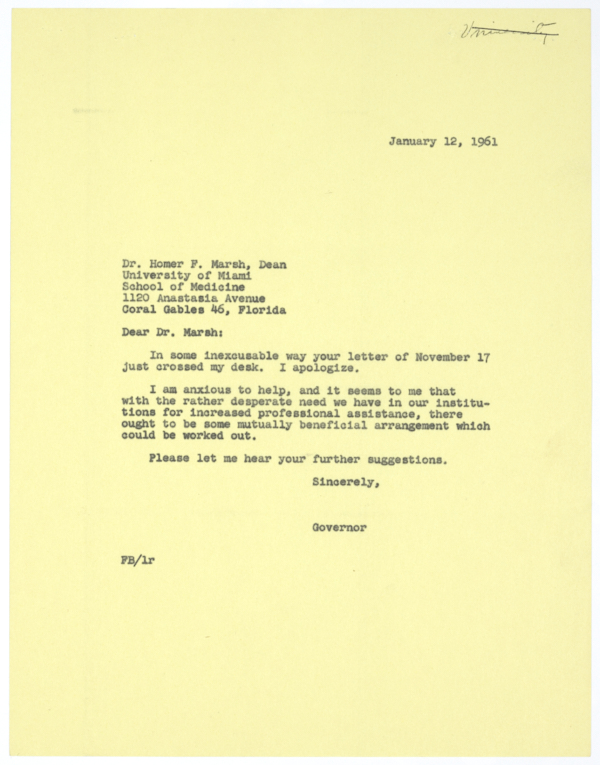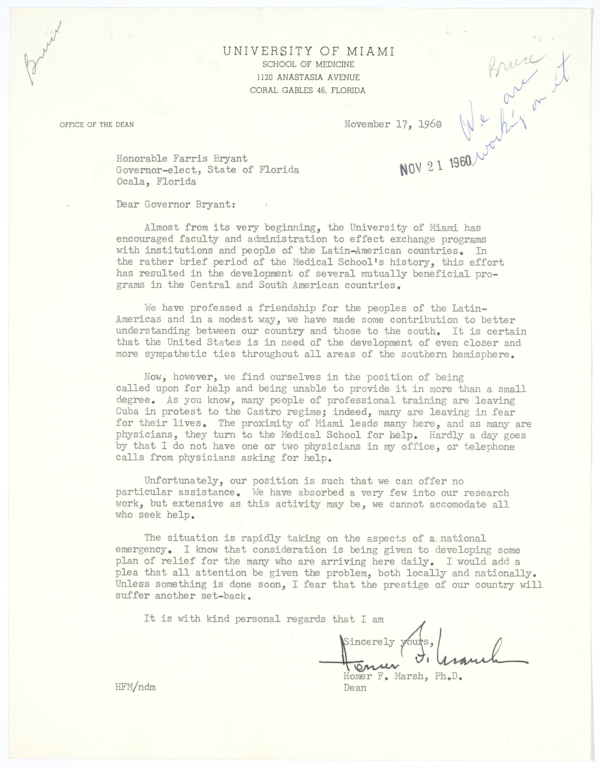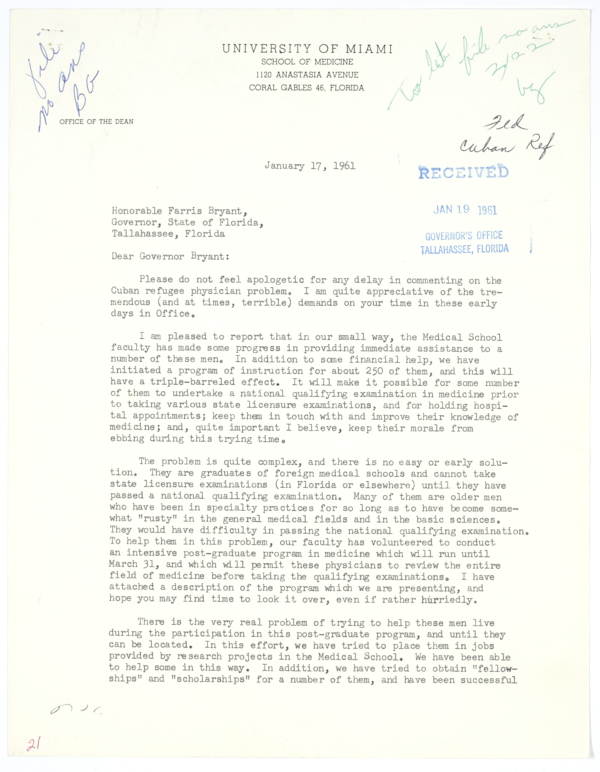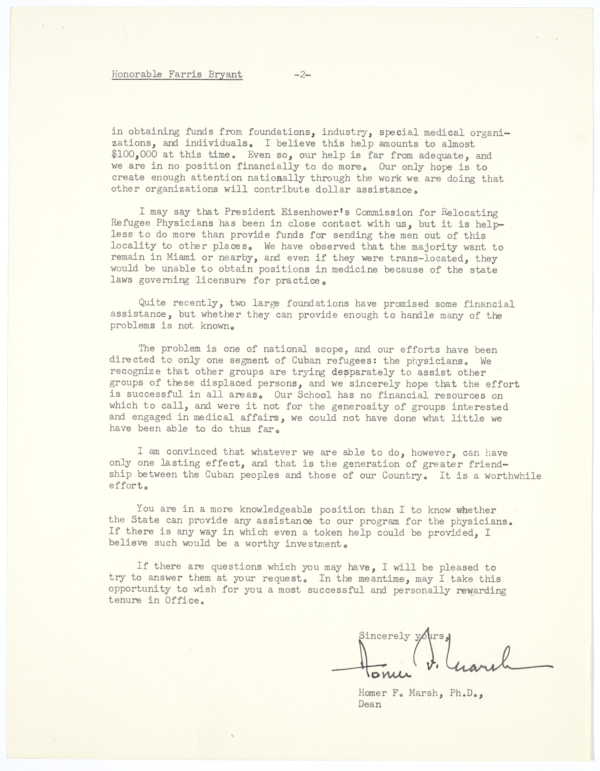Transcript
UNIVERSITY OF MIAMI
SCHOOL OF MEDICINE
1120 ANASTASIA AVENUE
CORAL GABLES 46, FLORIDA
OFFICE OF THE DEAN
November 17, 1960
Honorable Farris Bryant
Governor-elect, State of Florida
Ocala, Florida
Dear Governor Bryant:
Almost from its very beginning, the University of Miami has encouraged faculty and administration to effect exchange programs with institutions and people of the Latin-american countries. In the rather brief period of the Medical School’s history, this effort has resulted in the development of several mutually beneficial programs in the Central and South American countries.
We have professed a friendship for the peoples of the Latin-Americans and in a modest way, we have made some contribution to better understanding between our country and those to the south. It is certain that the United States is in need of the development of even closer and more sympathetic ties throughout all areas of the southern hemisphere.
Now, however, we find ourselves in the position of being called upon for help and being unable to provide it in more than a small degree. As you know, many people of professional training are leaving Cuba in protest to the Castro regime; indeed, many are leaving in fear for their lives. The proximity of Miami leads many here, and as many are physicians, they turn to the Medical School for help. Hardly a day goes by that I do not have one or two physicians in my office, or telephone calls from physicians asking for help.
Unfortunately, our position is such that we can offer no particular assistance. We have absorbed a very few into our research work, but extensive as this activity may be, we cannot accommodate all who seek help.
The situation is rapidly taking on the aspects of a natural emergency. I know that consideration is being given to developing some plan of relief for the many who are arriving here daily. I would add a plea that all attention be given the problem, both locally and nationally. Unless something is done soon, I fear that the prestige of our country will suffer another set-back.
It is with kind personal regards that I am
Sincerely yours,
Homer F. Marsh, Ph.D.
Dean
HFM/ndm
January 12, 1961
Dr. Homer F. Marsh, Dean
University of Miami
School of Medicine
1120 Anastasia Avenue
Coral Gables 46, Florida
Dear Dr. Marsh:
In some inexcusable way your letter of November 17 just crossed my desk. I apologize.
I am anxious to help, and it seems to me that with the rather desperate need we have in our institutions for increased professional assistance, there ought to be some mutually beneficial arrangement which could be worked out.
Please let me hear your further suggestions,
Sincerely,
Governor
FB/lr
UNIVERSITY OF MIAMI
SCHOOL OF MEDICINE
1120 ANASTASIA AVENUE
CORAL GABLES 46, FLORIDA
OFFICE OF THE DEAN
January 17, 1961
Honorable Farris Bryant,
Governor, State of Florida,
Tallahassee, Florida
Dear Governor Bryant:
Please do not feel apologetic for any delay in commenting on the Cuban refugee physician problem. I am quite appreciative of the tremendous (and at time, terrible) demands on your time in these early days in Office.
I am pleased to report that in our small way, the Medical School faculty has made some progress in proving immediate assistance to a number of these men. In addition to some financial help, we have initiated a program of instruction for about 250 of them, and this will have a triple-barreled effect, It will make it possible for some number of them to undertake a national qualifying examination in medicine prior to taking various state licensure examinations, and for holding hospital appointments; keep them in touch with and improve their knowledge of medicine; and, quite important i believe, keep their morale from ebbing during this trying time.
The problem is quite complex, and there is no easy or early solution. They are graduates of foreign medical schools and cannot take state licensure examinations (in Florida or elsewhere) until they have passed a national qualifying examination. Many of them are older men who have been in specialty practices for so long as to have become somewhat “rusty” in the general medical fields and in the basic sciences. They would have difficulty in passing the national qualifying examination. To help them in this problem, our faculty has volunteered to conduct an intensive post-graduate program in medicine which will run until March 31, and which will permit these physicians to review the entire field of medicine before taking the qualifying examinations. I have attached a description of the program which we are presenting, and hope you may find time to look it over, even if rather hurriedly.
There is the very real problem of trying to help these men live during the participation in this post-graduate program, and until they can be located. In this effort, we have tried to place them in jobs provided by research projects in the Medical School. We have been able to help some in this way. In addition, we have tried to obtain “fellowships” and “scholarships” for a number of them, and have been successful
Honorable Farris Bryant
-2-
In obtaining funds from foundations, industry, special medical organizations, and individuals. I believe this help amounts to almost 100.000 at this time. Even so, our help is far from adequate, and we are in no position financially to do more. Our only hope is to create enough attention nationally through the work we are doing that other organizations will contribute dollar assistance.
I may say that President Eisenhower’s Commission for Relocating Refugee Physicians has been in close contact with us, but it is helpless to do more than provide funds for sending the men out of this locality to other places. We have observed that the majority want to remain in Miami or nearby, and even if they were trans-located, they would be unable to obtain positions in medicine because of the state laws governing licensure for practice.
Quite recently, two large foundations have promised some financial assistance, but whether they can provide enough to handle many of the problems is not known.
The problem is one of national \scope, and our efforts have been directed to only one segment of Cuban refugees: the physicians. We recognize that other groups are trying desperately to assist other groups of these displaced persons, and we sincerely hope that the effort is successful in all areas. Our school has no financial resources on which to call, and were it not for the generosity of groups interested and engaged in medical affairs, we could not have done what little we have been able to do thus far.
I am convinced that whatever we are able to do, however, can have only one lasting effect, and that is the generation of greater friendship between the Cuban peoples and those of our country. It is a worthwhile effort.
You are in a more knowledgeable position than I to know whether the State can provide any assistance to our program for the physicians. If there is any way in which even a token help could be provided, I believe such would be a worthy investment.
If there are questions which you may have, I will be pleased to try to answer them at your request. In the meantime, may i take this opportunity to wish for you a most successful and personally rewarding tenure in Office.
Sincerely yours,
Homer F. Massh, Ph.D,
Dean


 Listen: The World Program
Listen: The World Program

